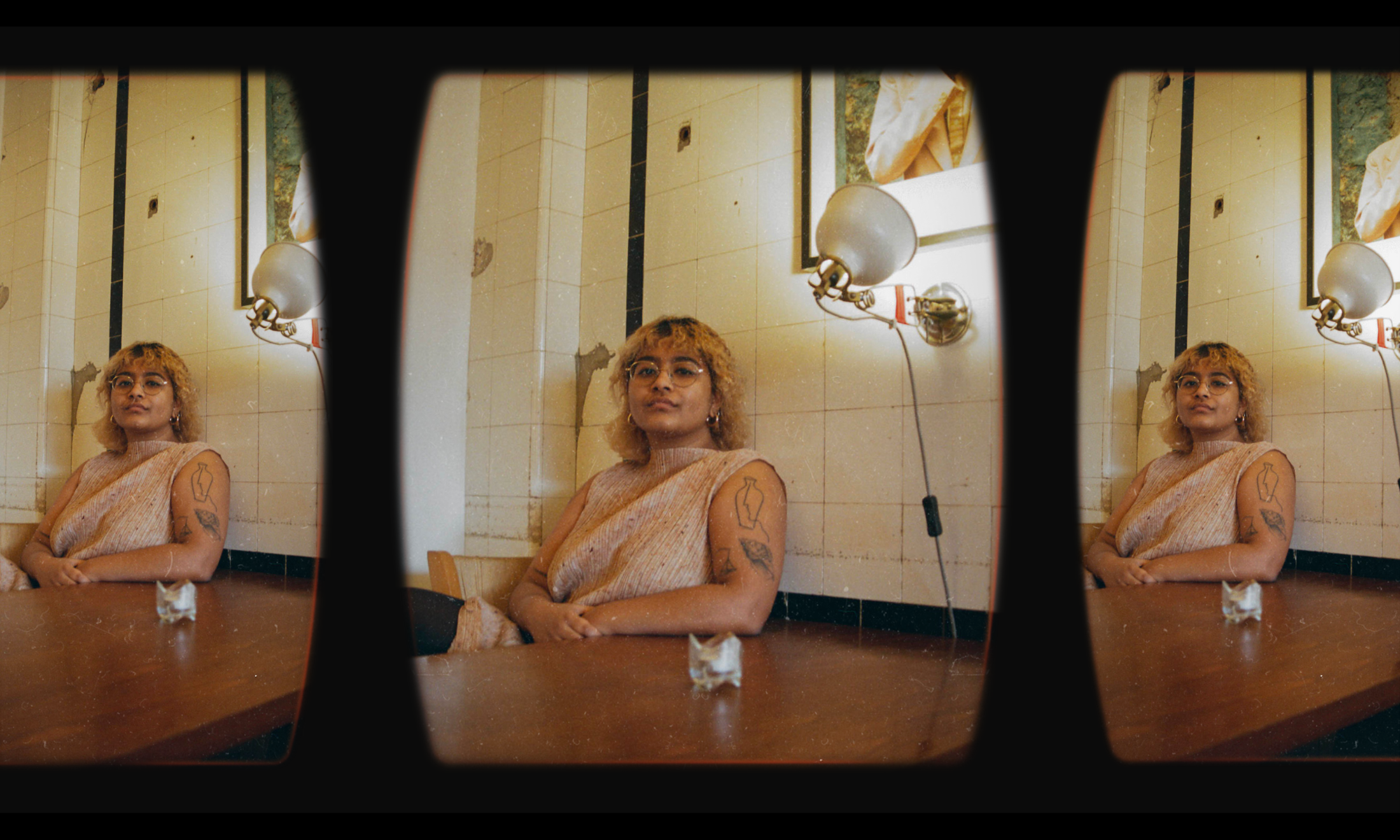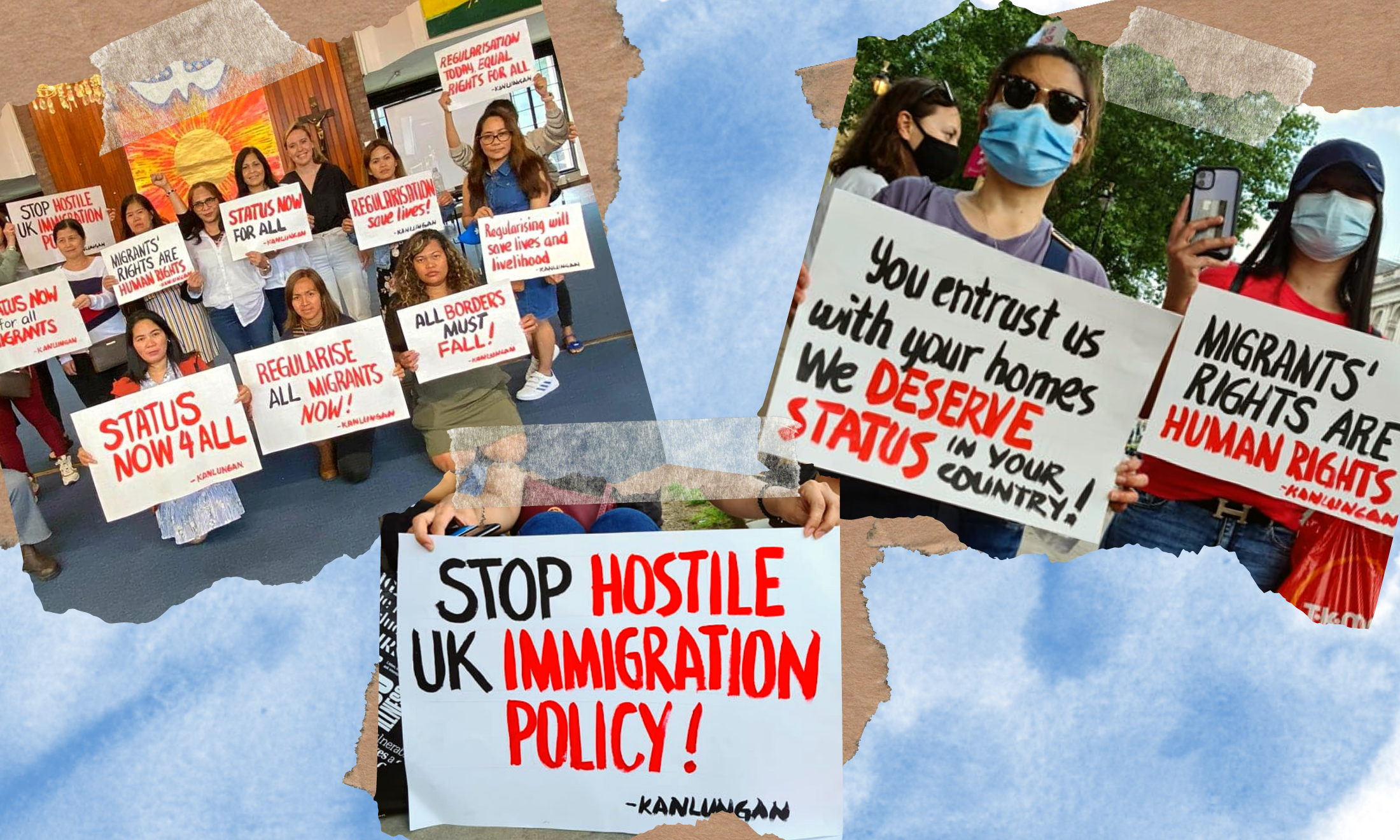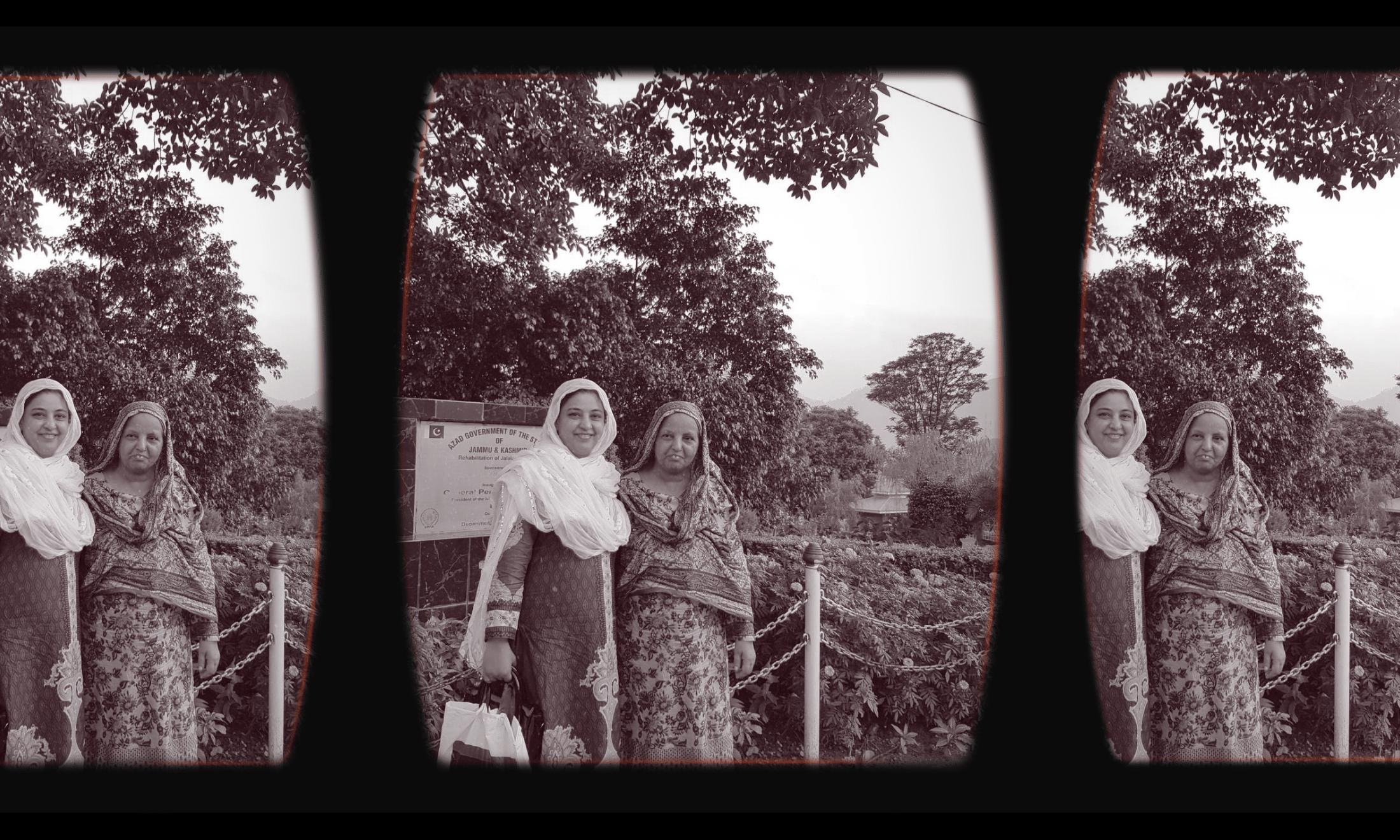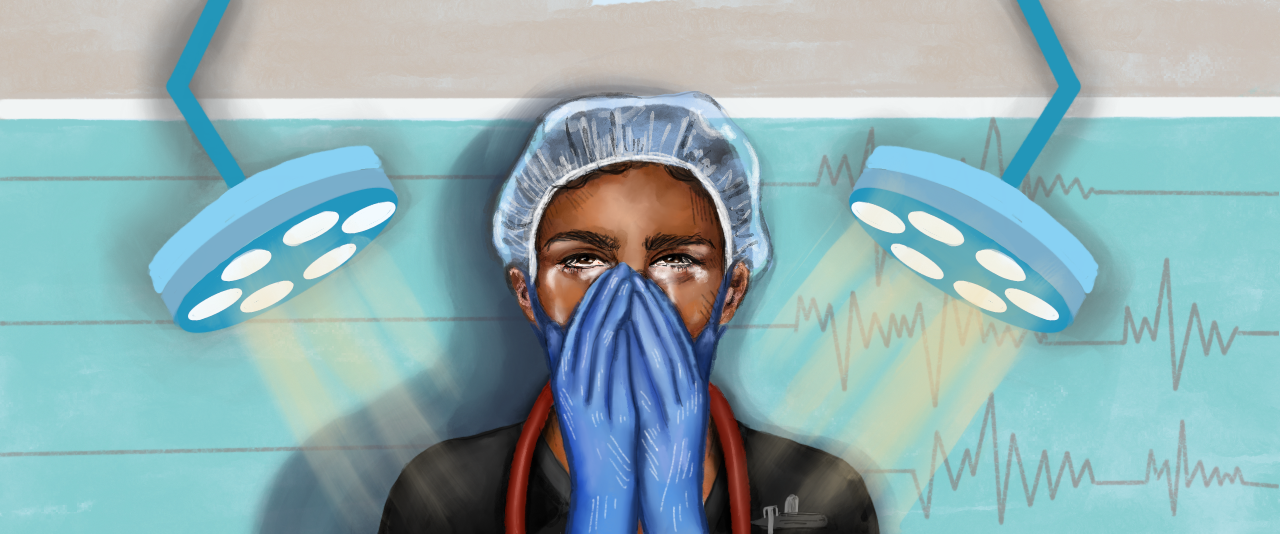
Illustration by Khadija Said
‘My mind was not there, I was heartbroken’: Black key workers are being forced to grieve at work
Black people in the UK have been disproportionately affected by Covid-19. From a woman who lost four relatives to the disease and had to swiftly return to work, to black families still grappling with the realities of racism in healthcare, Timi Sotire speaks to key workers about their experiences.
Timi Sotire
25 Jul 2020
The grieving process is distressing, but undergoing it during a global pandemic is an experience that most can’t even fathom. Black people are at a greater risk of dying of Covid-19 in the UK, and the community has experienced grief on both a personal and collective level. To make matters worse, Black key workers are risking their lives fighting the virus on the frontline, with many Black women having to return to work soon after losing a loved one to Covid-19. Their struggles continue to remain unnoticed and they’re left to silently suffer whilst the government ignores their concerns.
In April, I lost my grandma to Covid-19. As the matriarch of our family, she devoted the later part of her life to care for our family – assisting her children in raising her grandchildren. She had the warmest presence that just felt safe – it’s the small things that I will cherish forever, such as hearing her whisper “ọmọ grandma” (grandma’s child in Yoruba) in my ear whilst squeezing me tightly, my head resting on her chest. Towards the end of her life, she lived with my auntie, uncle and their three children, which included a new-born baby girl. When the nation was preparing for lockdown, we asked grandma if she wanted to self-isolate in another house. She refused, selflessly deciding that she’d continue looking after her grandchildren to help the family.
When grandma was admitted to hospital, the nurses were frank with us: she just wasn’t a priority to them. In her final moments, grandma was left in a hospital bed, her lungs filling with water whilst her oxygen levels steadily declined. Despite her central role in my family, the hospital took my grandma’s age and underlying health conditions as signifiers of the supposedly dispensable nature of her life. Over three months later, our family is still shaken by her sudden passing.
My mother, an NHS pharmacist, has found work triggering after losing her mother. “It is very difficult, dealing with people having the same symptoms as her. I review patients’ discharge summaries, and I ask myself: what did I do wrong? What could I have done differently?” She doesn’t have the privilege of using work as a distraction, “I was always revisiting the days leading to mum’s death, angry at how I managed it. You can’t forget what happened because you’re reminded of it every time you go to work.”
“I was working throughout all of it and continued to work even when he passed. I haven’t taken any time off”
Little thought is also given to NHS staff who return to work due to financial necessity. My mother is contracted as a freelancer and did not receive paid bereavement leave, returning to work just 14 days after grandmas’ passing, “if I don’t go to work, I don’t earn any money”, she says.
Unfortunately, my mothers’ case is not unique. Ade*, a social worker, lost her husband to Covid-19 in April. He suffered from a stroke in 2008, leaving him brain damaged and partly paralysed, losing his ability to talk. Because of his underlying health conditions, when he was admitted to hospital, the staff did not treat the virus – instead they swiftly placed him on palliative care. Ade tells me that she never stopped working whilst he was in hospital, “I was working throughout all of it and continued to work even when he passed. I haven’t taken any time off. As a freelancer, I just can’t afford to.” The anger in her voice is evident, as she goes on to exclaim, “I am an NHS worker, but because I am not permanent, there is no support. We are left to sort ourselves out.”
Multi-generational homes are rising in the UK, meaning that the high number of older people dying from Covid-19 will affect families in more ways than the government is recognising. As they lived under one roof, my auntie relied on grandma’s assistance for her one-year-old daughter whilst she worked as an NHS nurse. Since grandma passed, she has been forced to find childcare at a time when safe options are extremely limited.
My auntie tells me that her workplace has consistently refused to accommodate her. Sounding anxious, she exclaims in a flurry, “I’ve asked so many times if it was possible for me to work from home. They always say no. This is the time I need them most, and they’ve just decided not to do anything.” Feeling helpless, my auntie has had to use her annual leave so that she can stay at home two days a week. “If grandma was around, she would be looking after the children for me,” she adds. “I can’t afford to put my child in day-care five days a week. That will mean half of my salary will go on childcare alone.”
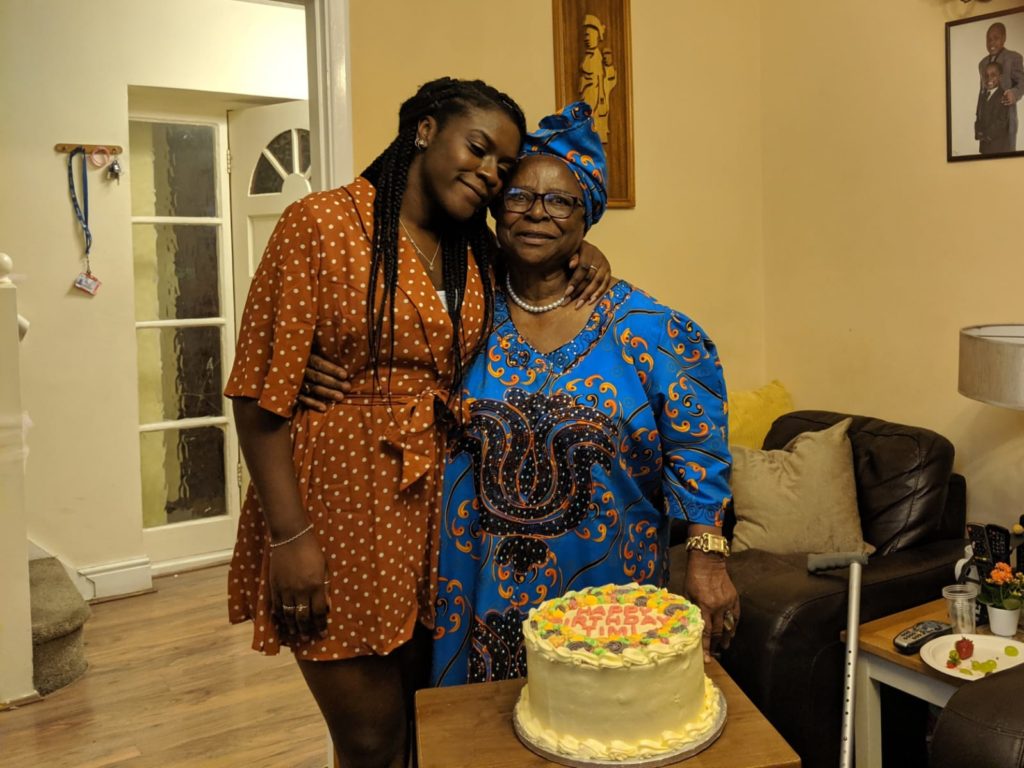
Samara Linton, the co-editor of The Colour of Madness, an anthology exploring the BAME mental health experiences in the UK, tells me that “when people talk about deaths, we just view it as numbers. We forget that, for every person lost, there’s a community of people that have been affected. When there is an excess of black people dying, there is an excess of trauma within that community. There’s a collective grief as well as a personal grief.”
Jemar Tisby coined the term “kinship calamity” in reference to unification of black people through common oppression under white supremacy. Constantly hearing about the deaths of individuals like you, whether that is due to Covid-19 or at the hands of the state, results in a sense of collective trauma shared across the Black community. These Black women are fed a constant stream of bad news surrounding Black death whilst dealing with their own personal grief, and are given no respite in their day jobs. It goes without saying that this never-ending cycle of morbidity will have a negative impact on their mental health.
Lorraine Mighty works in higher education, and after losing four loved ones to Covid-19, has returned to work whilst caring for her two children. For her, this year has revealed the ever-present nature of death in the Black experience. “Now more than ever, we’ve seen the fragility of our life,” she says. It is easy to feel exhausted and alienated, as you’re reminded that these societal inequalities can very easily be localised in your life, and that yourself and your loved ones are at risk.
My auntie notices how her mental health has deteriorated in the past few months. “What has happened to me has taken such a toll on my family and mental health, I’m really anxious every morning because I don’t know what’s going to happen,” she says. My mother explains that the all-consuming guilt weighs on her mind at work, “even when I first returned to work, I felt so bad. I knew I wasn’t doing my job correctly. My mind was not there because I was so heartbroken.”
Yet, employers show little care to their staff when returning to work after losing loved ones. “[They] are not willing to be flexible,” declares Samara. “We can’t be ‘business as usual’ because this is not a usual time.” My auntie says, her voice shaking, “I get so angry because I know that work doesn’t understand what I’ve been through. I lost my mother, she was living in my house and looking after my children. They just expect you to go back to work with no struggle as if you’re a robot.” Unfortunately, this lack of care shown towards Black NHS workers has merely been exacerbated by the recent pandemic – not only are Black NHS staff underrepresented in senior management roles, but a 2019 study revealed that 28% of Black NHS staff have experienced harassment, bullying or abuse from staff in the last 12 months.
“We forget that, for every person lost, there’s a community of people that have been affected”
Lorraine is concerned at how reactive employers have been in this period. “They need to not just solely follow government advice – it’s the bare minimum,” she tells me. “Employers need to realise that there is a disconnect between what the government is saying and the lived reality of their members of staff.” This is especially true for black staff, and concrete measures need to be put in place to ensure that black employees are protected, not just now, but in the future too. Lorraine echoes this sentiment. “They need to be considerate of the needs of black people, there needs to be safe spaces for discussion,” she adds. “This might be with a line manager, but it might also be mental health support around.”
On a governmental level, Ade expressed disappointment at how her family was treated after her husband’s passing. “They talk so much, but do nothing,” she says. “It’s such a traumatic experience, and it would be nice if the government could just acknowledge it.” To make matters worse, Ade’s family has been failed by the benefits system. “My husband used to be on benefits. The day he died; the benefits stopped. They accidentally paid me some benefits after he passed, but they’ve asked for it back.” Such a clear disregard for Black lives has been shown by this government, which my mother exclaims to me, “The government’s done nothing to understand the pain that we’re going through.”
Yvonne Field is a part of The Ubele Initiative, a social enterprise with a mission to contribute to the sustainability of the African Diaspora community. During the Covid-19 pandemic, their efforts have been diverted to creating the Majonzi fund, dedicated to providing therapeutic support to BAME communities impacted by Covid-19, as well as providing small grants for family memorials once lockdown is lifted. Yvonne tells me that the high number of Black Covid-19 deaths “impacts us all personally and on a wider community level”.
Recognising this, Yvonne says that The Ubele Initiative is devoted to ensuring that BAME communities are given the time and space to properly remember those they’ve lost after lockdown. “Minority communities are in shock. It’s come out of the blue,” she says. The Ubele Initiative is pressuring the government to carry out an independent enquiry and be held accountable for their gross mishandling of the pandemic. “The government needs to admit that they got this really wrong,” she says firmly. “They need to know about the abject devastation it’s caused for us.”
My grandma’s unexpected passing has irrevocably altered my life. Black families across the country are either grieving the sudden deaths of those they love or paralysed by a perpetual feeling of anxiety surrounding the health and wellbeing of those around them. More care needs to be given to Black key workers who are facing these struggles – they shouldn’t be an afterthought.
*Names have been changed to protect identities

Britain’s policing was built on racism. Abolition is unavoidable

How Pakistan’s Khwaja Sira and transgender communities are fearing and fighting for their futures

Their anti-rape performance went viral globally. Now what?




